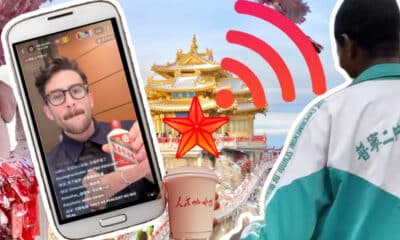China Celebs
China’s Celebrity Weight Craze: Qin Hao’s Viral Diet and Body Anxiety Behind the Weight-Loss Trend
The extreme diet of Chinese actor Qin Hao has sparked a trend of people sharing photos of their corn and egg meals. It’s yet another celebrity weight-loss trend that is more about unrealistic expectations than healthy ways of shedding pounds.
Published
3 years agoon
By
Zilan Qian
Actor Qin Hao’s remarkable weight loss has sparked waves of online excitement over a potential new diet plan. Qin is not the only Chinese celebrity whose weight loss journey has become an online hype. But behind the relentless pursuit of celebrity weight loss plans lies the issue of body anxiety, particularly among young Chinese women.
Why do we see so many photos with one ear of corn on Weibo these days? It has everything to do with Qin Hao (秦昊). The actor, renowned for his role in the highly acclaimed 2020 Chinese drama series “The Bad Kids” (隐秘的角落), has recently garnered significant attention for his appearance in another compelling series titled “The Long Wait” (漫长的等待).
This time, his surge in popularity is not just because of his exceptional acting abilities or the captivating character he portrayed, but mostly because of the remarkable diet plan he followed to lose weight during the filming of the series.
In his latest role, Qin played a middle-aged man with a chubby physique, round cheeks, and a beer belly. He had put on a lot of weight to play this character. However, later on, the director asked him to quickly lose weight and “sharpen up” (“必须瘦出棱角”).
Qin’s wife, Yi Nengjing (@伊能靜), discovered an online diet menu that helped Qin successfully lose over 20 pounds, resulting in a significant transformation in his appearance. Due to numerous inquiries from fans and followers, Yi decided to share the diet plan on her Weibo account.
The five-day diet plan consists of the following meals:
Day 1: Only unsweetened soy milk is consumed throughout the day.
Day 2: Each meal consists of one ear of corn.
Day 3: Breakfast includes dragon fruit, lunch consists of an apple, and dinner consists of blueberries.
Day 4: Breakfast consists of one boiled egg, while lunch and dinner consist of boiled shrimp.
Day 5: Breakfast includes broccoli, lunch consists of spinach, and dinner consists of lettuce.
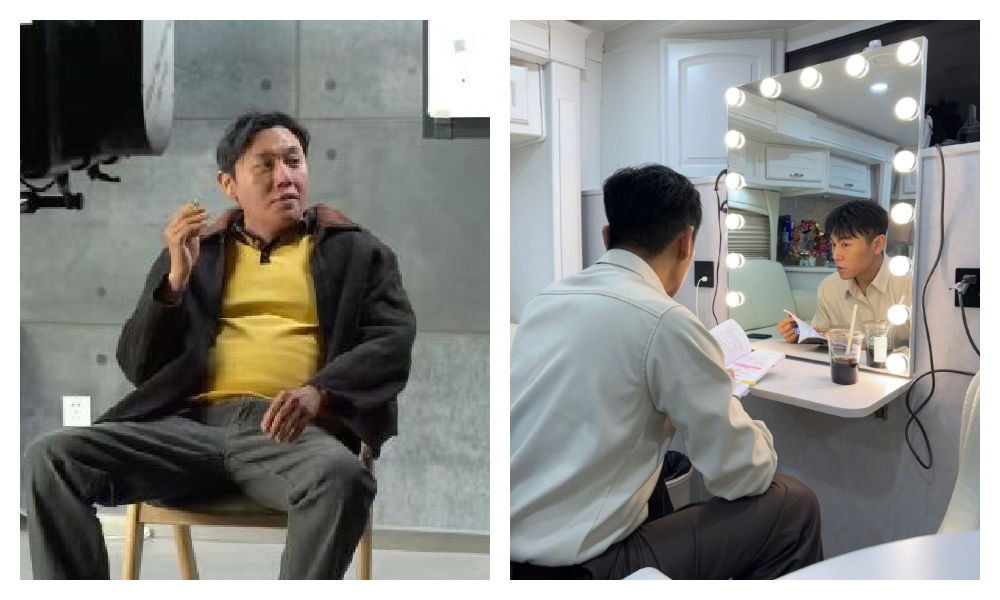
Qin before (left) and after (right) following the diet plan. Photos from Yi Nengjing’s Weibo post.
On Weibo, many people trying out this diet are posting photos of their daily meals, resulting in dozens of photos of a single ear of corn being posted on the platform these days.

Many Chinese netizens are posting photos of corn – their entire meal according to day 2 of Qin Hao’s diet (images via Weibo.com).
Despite the supposed effectiveness of the diet, Yi also issued a warning to her followers. “I want to emphasize once again that I do not recommend this menu to anyone,” she wrote on Weibo. “The entire process is incredibly arduous, and Qin experienced weakness in his legs due to hunger for some days.”
Despite the warning, the menu still managed to attract a significant number of netizens willing to give it a try. With titles like “Challenging Qin Hao’s Diet Plan (挑战秦昊饮食法)” and “Losing 8 Pounds in Five Days (五天瘦八斤),” many people took to platforms such as WeChat, Bilibili, and Weibo to share videos, images and texts documenting their experiences with the same diet plan and the amount of weight they lost each day.
Among those who decided to try the diet plan was the renowned screenwriter and producer Yu Zheng (于正), known for his works such as “The Palace” (宫) and “The Story of Yanxi” (延禧攻略). Yu shared on his Weibo account that he successfully lost 10 pounds in just a few days by following Qin’s diet plan. In doing so, he also inspired others to give it a try.

Bilibili users sharing themselves practising Qin’s diet plan.
While some individuals recognize the extreme nature of Qin Hao’s diet plan, they have made modifications by adding carbohydrates and proteins on certain days or incorporating other “diet foods” like cucumbers or healthy snacks.
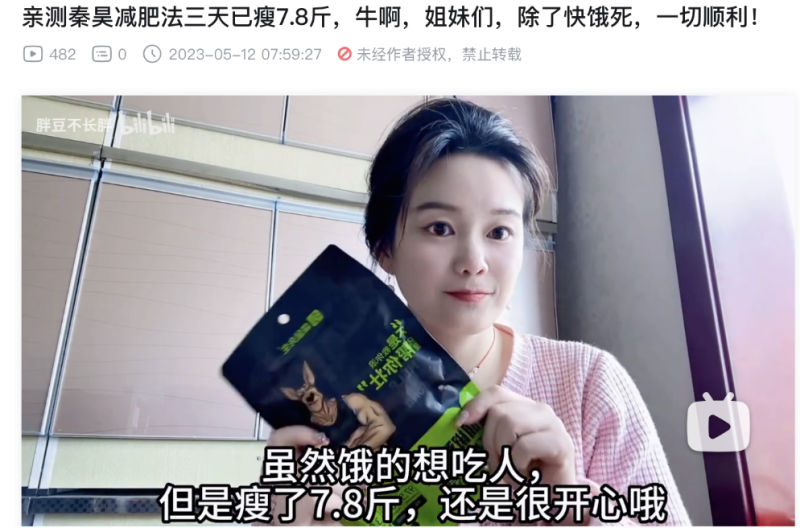
A user on Bilibili tried out Qin Hao’s diet plan and shared her experience. Although she admitted feeling “extremely hungry,” she said she lost almost 8 pounds and was “very pleased” with the outcome.
However, many choose to strictly adhere to the original plan, expressing sentiments such as “As long as I’m not starving to death, I’ll push myself to the limit” or “Even though I’m so hungry that I could eat a person, I’m still very happy with my progress.”
EXTREME CELEBRITY DIETS
“You are truly too fat.”
Qin is not the only celebrity whose weight loss journey has captured widespread attention. Earlier this year, another viral trend emerged among netizens, who urged director Guo Jingming (郭敬明) to establish a weight loss camp due to the noticeable weight loss among actresses who had worked on his film sets. On Weibo, this phenomenon was described as “no one can leave Guo Jingming’s film crew without losing weight” (“没有人能够胖着走出郭敬明剧组”).
Guo later disclosed his diet plan for actors and actresses during a television program. According to Guo, they were required to adhere to a diet that excluded oil, salt, and sugar. Additionally, he admitted that he would tell them “you are truly too fat (你真的太胖了)” on a daily basis, as a form of persuasion for those who were reluctant to follow the diet plan. Despite the extreme nature of this diet and his ‘brainwashing’ methods, many individuals continued to express their desire for Guo to realize an actual weight loss camp for them to join.
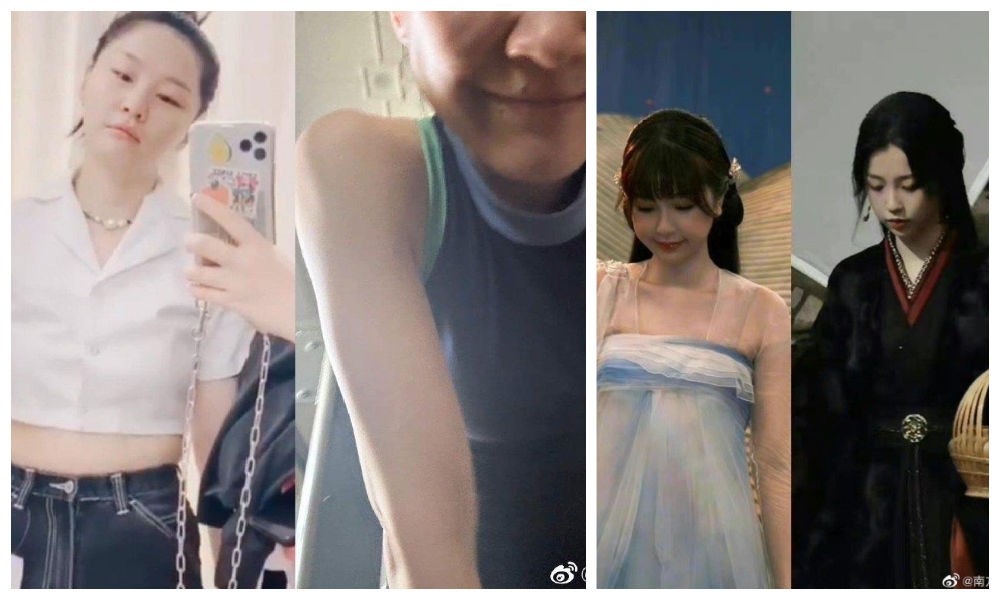
Weibo users compared photos of actresses Yu Shuxin and Jin Jing before and after joining Guo’s film crew to illustrate the effectiveness of Guo’s diet plan. The post where the above photos come from simply said: “I want to go! (想去!)” after the hashtag “#Guo Jingming film crew diet camp #郭敬明剧组减肥营#.
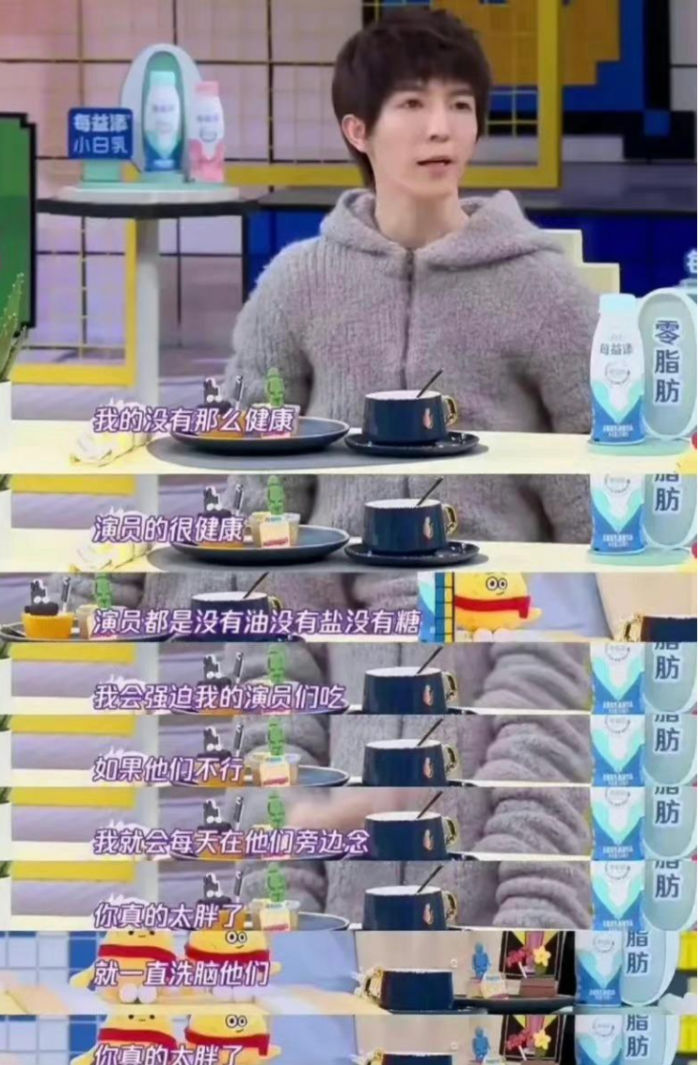
Guo reveals his way of helping actors lose weight (source).
The trend of following celebrity diets for weight loss remains popular, with an increasing number of individuals adopting the diet plans promoted by celebrities like Yu Shuxin, IU, Zhang Tianai, and others.
These diets come in various forms, ranging from single-food diets like cucumber and egg or boiled broccoli with plain porridge, to more restrictive approaches that eliminate specific ingredients, such as carbohydrates, or advocate for skipping evening meals. The widespread popularity of these diets is evident on social media, where netizens, mostly female, try them out and document their weight-loss journeys, sharing their progress with a wider audience.

Screenshot of the cover photo of one video on Bilibili introducing Yu Shuxin’s diet plan, which has been played over 150,000 times. The title says “Yu Shuxin’s way of losing 20 pounds’ weight. Revealing the diet plan to make your body easy to slim down! Losing 10 pounds in 10 days!”
The majority of posts and short videos revolving around these diet plans often feature attention-grabbing titles like “losing xx pounds in xx days,” accompanied by celebrities showcasing their slimmed body shapes.
CONCERNS SURROUNDING CELEBRITY CRASH DIETS
“Let me advise you: never, ever go down this terrible path.”
With the increasing popularity of celebrity diets, concerns about their impact on (mental) health have arisen. Doctors have issued warnings against attempting Qin Hao’s diet plan, cautioning that it can cause significant harm to the body and result in weight gain once discontinued.
Diets that severely restrict calorie intake, like this one, can have detrimental effects such as weakened immunity, decreased bone density, impaired memory, hair loss, and an increased risk of depression. Netizens commenting on posts of people trying these diets often warn others against blindly following their lead. One user offered a stern warning, saying: “To my sisters who haven’t started dieting, let me advise you: never, ever go down this terrible path.”
Despite the prevailing health concerns associated with celebrity diets, not everyone places their well-being above achieving a desired body shape. In response to a diet plan video by Kpop singer IU, one user acknowledged the potential harm it could cause but still said losing weight was their primary goal, as being overweight made them feel miserable: “I don’t care if it’s harmful to my body, as long as I can lose weight.”
Other users argue that everyone has the right to do whatever they want with their body: “We are all adults and responsible for our own affairs. If you want to lose weight, eat less. If you don’t want to lose weight, then continue to be overweight.”
PURSUIT OF THE PERFECT BODY
“For female celebrities, being fat destroys everything.”
Behind the never-ending new celebrity diet plans is the question of why celebrities losing weight garners such significant attention. It appears that shedding pounds has become a convenient method for celebrities to attract public interest and enhance their overall image. Losing weight is often portrayed as a symbol of willpower and dedication to one’s career.
For instance, Yuan Shanshan, who previously faced criticism for her appearance in certain TV series, received applause and positive attention after slimming down and achieving a V-line figure. Media reports frequently associate female celebrities’ dietary practices with the concept of “self-discipline,” utilizing titles such as “How self-disciplined are female celebrities?” to highlight their various weight-loss approaches.
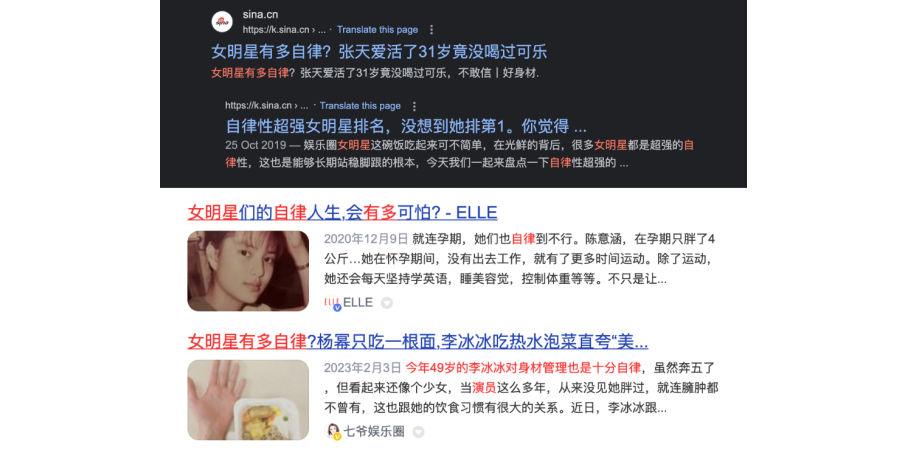
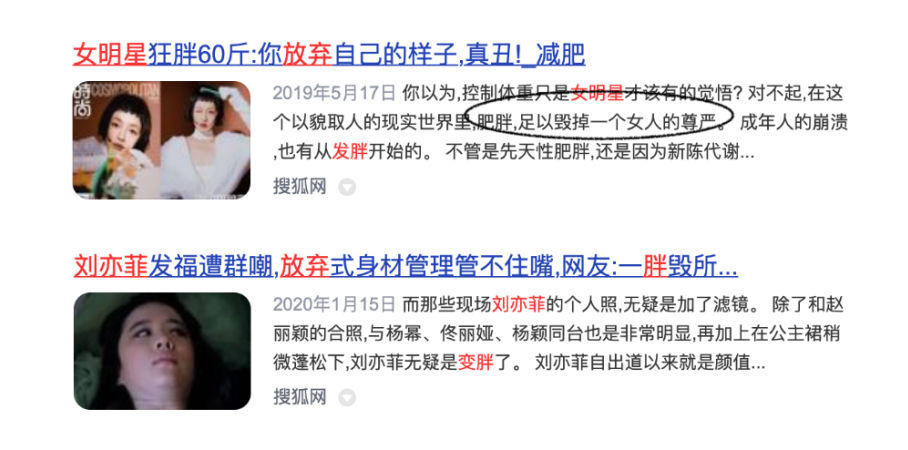
Articles perpetuating body shaming comments towards female celebrities for weight gain. Headlines employing phrases like “the image of you giving up yourself is ugly” and “being fat destroys everything” depict weight gain negatively. The highlighted sentence emphasizes the damaging impact of being fat on a woman’s self-esteem.
On the other hand, when female celebrities gain weight, they are often accused of “betraying” their professional careers or “giving up” on their ambitions.
A quick online search reveals how numerous news articles and blog titles highlight female celebrities’ self-discipline through their successful weight loss. These pieces often showcase extraordinary diet methods, like relying on single strands of noodle as a carbohydrate source or consuming plain, boiled vegetables without any additional ingredients.
SLIM LIKE A CELEBRITY
“Will your boss promote you because you’re as thin as a celebrity?”
The public’s scrutiny of celebrities’ weight, often using it as a measure of willpower and success, is a common phenomenon, but celebrities themselves also influence the public’s perception of the ‘perfect’ figure. On various variety shows, female celebrities’ heights and weights are increasingly showcased, which inadvertently contributes to viewers’ anxieties about their own bodies.
Articles on social media treat these measurements as if they represent the standard for the majority, presenting titles such as “After looking at the heights and weights of these female celebrities, I swear I will never eat again,” or “The true heights and weights of female celebrities – a reference for weight loss,” and: “How light is thin? Revealing female celebrities’ heights and weights.” These articles contribute to the idolization of specific body shapes and weights as symbols of beauty and perfection.
‘Am I too fat weighing xx pounds?’ ‘What weight is considered “fat” in today’s society?’ ‘Why do people care about women’s weight so much?’ ‘Why am I so obsessed with my own weight?’ As women track and critique the weight fluctuations of female celebrities, many are grappling with questions about body image on social media. They seek answers to their own concerns, shaped by constant exposure to the seemingly ideal body weights of these celebrities.
Amidst all the celebrity weight craze, more critical voices are emerging in the Chinese social media sphere. Witnessing people blindly following celebrities’ weight loss journeys, one Zhihu user recently wondered: “Why should everyone strive to have the same bodies as the ones displayed by celebrities? Is there any tangible benefit for ordinary individuals to achieve the same level of thinness as these celebrities? Will your boss promote you or increase your salary simply because you’re as slim as a celebrity?”
Many individuals also question the connection between weight loss, self-discipline, and professional success. They assert that celebrities’ ability to maintain a slim figure is predominantly driven by financial incentives rather than exceptional personal qualities.
One Weibo user commented on Qin Hao’s diet plan, highlighting the disparities between celebrity lifestyles and those of everyday individuals: “Most people don’t have jobs that demand such extreme measures, nor do they lead a celebrity lifestyle with chauffeured transportation and dedicated services for nutrition and exercise management. Furthermore, everyday individuals don’t need to rely on weight loss as a means to seek public attention or stay in the spotlight.”
Chinese author Mao Li (毛利), in a Zhihu post, shared her perspective on the issue and acknowledged that she also has wasted valuable time on futile body image anxieties. She suggests breaking free from the media’s “perfect body” hype, embracing self-acceptance, and finding joy in living together with our bodies. She encourages people to “accept it, enjoy it, and praise it.”
By Zilan Qian
Get the story behind the hashtag. Subscribe to What’s on Weibo here to receive our newsletter and get access to our latest articles:
Spotted a mistake or want to add something? Please let us know in comments below or email us. First-time commenters, please be patient – we will have to manually approve your comment before it appears.
©2023 Whatsonweibo. All rights reserved. Do not reproduce our content without permission – you can contact us at info@whatsonweibo.com.
Zilan Qian is a China-born undergraduate student at Barnard College majoring in Anthropology. She is interested in exploring different cultural phenomena, loves people-watching, and likes loitering in supermarkets and museums.

You may like
China Celebs
Beauty Influencer Du Meizhu Accused of Scamming Fan Out of $27K
Published
5 months agoon
June 27, 2025
🔥 Quick Take: Trending in China
This is a brief update from our curated roundup of what’s trending in China this week. A version of this story also appears in the Weibo Watch newsletter. Subscribe to stay in the loop.
Chinese beauty influencer and livestreamer Du Meizhu (都美竹) is facing online backlash this week after a former female fan filed a police report accusing her of scamming her out of nearly 200,000 yuan (approx. US$27,800).
The fan, known online as Sister Bing (Weibo handle @冰点人a冰点), has come forward with detailed allegations, claiming Du began swindling her in 2022.
Du Meizhu rose to national prominence in 2021 when she was 19 years old and became the first person to publicly accuse Chinese-Canadian pop star Kris Wu (吴亦凡) of rape and sexual misconduct. After at least 24 more victims also came forward, Wu was formally arrested on suspicion of rape in mid-August 2021 and was later sentenced to 13 years in prison.
It was around this time that ‘Sister Bing,’ whose real name is Ms. Zhu (朱, born 1979), started following Du Meizhu on social media. As a hard-working single mother of a daughter, she said she sympathized with Du and wanted to show her some support. In a Weibo post published in 2024, she detailed how Du Meizhu began noticing Zhu’s online interactions in early 2022 and added her as a friend on WeChat.
In private conversations, Du shared complaints about her difficult life, and as the two talked more and more, Zhu began transferring small amounts of money to help. Over time, Du said she needed money for various things—from financial support for school to legal disputes and expensive medical treatments for family members. Between 2022 and 2023, Zhu claims she transferred nearly 200,000 yuan in total.
At the end of 2023, Zhu–who works as a taxi driver–urgently needed money due to a family crisis. She reached out to Du to ask if she could repay the money. According to Zhu, she only returned 30,000 yuan (US$4,180) and refused to pay more, even though at the same time, Du was allegedly flaunting luxury brand purchases and had plans to buy a villa.
On June 25, 2025, Zhu posted an update on her Weibo account, saying she had traveled to Ulanhot City in Inner Mongolia – Du’s hometown – to seek justice and report the case to local authorities.
Du Meizhu has responded to the allegations on social media, writing that she “won’t admit to things I haven’t done.” She does not deny that Zhu gave her money.
She writes: “When she had money, she was lavishly spending it on gifts in all kinds of livestreams. Now that she’s broke, she wants it back from the streamers? After I transferred her thousands of yuan, she’s still not satisfied and is now starting to extort me. No amount of moral pressure will work. I have a clear conscience!”
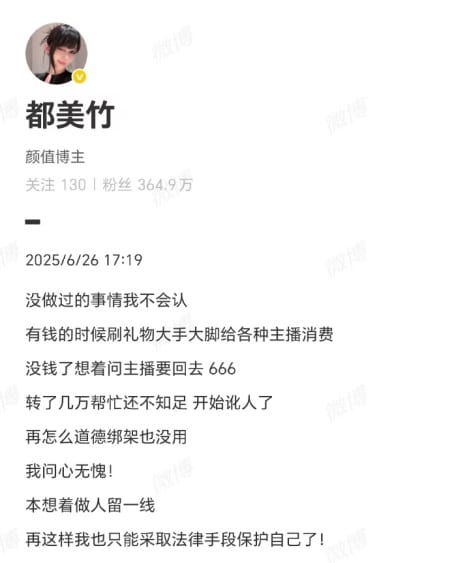
The post by Du Meizhu
The case has blown up online. One post by Ms. Zhu has already received over 133,000 likes and is still gaining traction.
But the developments surrounding the case are puzzling to some. Du Meizhu has long maintained a social media image of wealth, showcasing a lifestyle filled with Dubai travel, horseback riding, luxury food, and fashion. Why would she need to take money from a single mum? Du is being criticized not only for faking her wealth, but also for accepting so much money from a woman who clearly needed the money for her own family.

Du Meizhu social media photos.
Although the story is attracting a lot of attention online because it exposes private conversations between Du and the woman – and, frankly, many netizens just enjoy the drama, – it also says a lot about China’s thriving livestreaming industry and just how close online followers can feel to the influencers they follow. In these kinds of online communities, it is common for fans and followers to send livestreamers money or ‘virtual gifts’.
In the case of Ms. Zhu, some netizens doubt that she can prove in court that she loaned Du the money instead of gifting it to her. People also criticize Zhu: why did she spend so much money on an online influencer instead of on her own daughter?
Either way, many Chinese netizens feel that it was not right of Du Meizhu to take advantage of a single mum like that. Even if she’s not legally wrong, they feel she lacks moral integrity.
Du’s most recent social media post—featuring her in so-called “old money fashion” outfits—has only added fuel to the fire. Dozens of commenters flooded the post with demands that she repay Ms. Zhu. Though Du seemingly tried to delete the negative comments, they kept pouring in. “At this rate, there won’t be any comments left,” one user wrote.
Whether or not Du Meizhu ultimately faces legal consequences, the backlash is already taking a toll. She might escape the courtroom, but won’t be able to escape the court of public opinion.
By Manya Koetse
(follow on X, LinkedIn, or Instagram)
Spotted a mistake or want to add something? Please let us know in comments below or email us. First-time commenters, please be patient – we will have to manually approve your comment before it appears.
©2025 Whatsonweibo. All rights reserved. Do not reproduce our content without permission – you can contact us at info@whatsonweibo.com.
China Celebs
Earring Gate: Huang Yangdiantian and the 2.3 Million RMB Emerald Earrings
Online sleuths connect emerald earrings to post-earthquake business ties—sparking official investigations.
Published
6 months agoon
May 25, 2025By
Ruixin Zhang
Dear Reader,
This week, the Chinese internet exploded over a pair of earrings worn by a child actress.
In recent years, China’s netizens have been paying closer attention to so-called “nepo babies”—the children of the rich and powerful whose success often seems tied more to family connections than to talent.
Some, like Huawei’s heiress Yao Anna (姚安娜), have been criticized for using family ties to enter the entertainment industry. Others, like the infamous “Miss Dong” in the recent medical scandal, have sparked public outrage for abusing privilege to bend academic rules.
Facing economic difficulties and a tough job market, the public’s tolerance for nepotism and corruption is running increasingly thin. But when these issues touch on national trauma, including natural disasters and charity efforts, the public anger runs even deeper.
That’s why a Chinese teenage actress named Huang Yangdiantian (黄杨钿甜) recently found herself at the center of an online storm.
Earring Gate: Behind the Sparkle
Huang, born in 2007, started her career as a child actress in the 2017 historical drama Princess Agents (楚乔传).

She later gained more popularity by starring in other hit series, including Ruyi’s Royal Love in the Palace (如懿传), and also built an online following.
The recent scandal broke out after Huang shared a series of photos on Xiaohongshu, where she has around 328,000 followers. In the photos, meant to celebrate her 18th birthday, she’s seen proudly wearing a pair of sparkly emerald earrings. In the caption, she mentioned they belonged to her mom.
Sharp-eyed netizens quickly identified the earrings as a pair from the British luxury brand Graff—worth a jaw-dropping 2.3 million RMB (319,000 USD).

Digging deeper, online sleuths also found a Weibo post from 2018 showing Huang’s mother wearing a Cartier bracelet, which now retails for around 450,000 RMB (62,400 USD).
Considering Huang’s limited acting experience and modest earnings as a child actress, these luxury items raised eyebrows—and questions about where the family’s wealth was really coming from.
The “online detectives” didn’t stop there. They discovered that Huang’s father, Yang Wei (杨伟), was once a public official in Ya’an City (雅安市), Sichuan Province. After a major 7.0-magnitude earthquake struck Yan’an in 2013 (the Lushan Earthquake), Yang was reportedly involved in post-earthquake reconstruction projects, including investment and tendering.
Interestingly, in 2014, just a year after the earthquake, Huang’s family registered a film and culture company in Shenzhen with 5 million RMB (694,000 USD) in capital. Initially, the company’s legal representative was Huang’s uncle, followed by her mother in 2016. But after Yang resigned from public service, he took over as the official legal representative.
During the pandemic in 2020, Yang also registered a biotech company, which was later rebranded as a beauty and cosmetics trading business. The timing—one company during post-quake reconstruction, then another during a global health crisis—raised suspicions about whether Yang was using national emergencies as business opportunities.
It was also discovered that the Yang family currently lives in a luxury villa in one of Shenzhen’s most upscale neighborhoods, valued at over 100 million RMB (approximately 13.8 million USD).
How did Yang get enough money to start such companies and purchase a multi-million yuan villa? Even if all his official work and business ventures were legitimate, netizens pointed out it still wasn’t enough to explain the family’s enormous wealth.
Huang’s Father Responds, Netizens Dig Deeper
As the controversy grew, Huang’s father responded on May 16 via Weibo, using an account simply named “Huang Yang’s Dad” (黄杨爸爸).
In his post, he claimed that the emerald earrings were fake and of little value. He acknowledged having worked for the Yan’an government but denied any involvement in post-earthquake work, saying the online accusations against him were a case of mistaken identity—“just someone with the same name.” He even added, “I’ve never been corrupt—feel free to report me.”
But the “same name” defense didn’t hold up for long.
In a second wave of ‘detective work’ by online sleuths, netizens found a phone number listed under the name “Yang Wei” on a government website related to post-earthquake reconstruction projects in Ya’an. Some tried sending a small transfer to this number via Alipay, revealing that the profile picture linked to that account was a photo of Huang and her mother when she was younger, immediately making his “same name” explanation completely implausible.
Soon after, the account could no longer be found on Alipay, but because the number was likely tied to many services and platforms, it wasn’t easy to erase entirely. People quickly traced the same phone number to Yang’s accounts on other platforms. Around the same time, the legal representatives of the family’s companies were abruptly changed, only further fueling public suspicion.
Huang’s talent agency issued a statement calling the online rumors false but didn’t offer any concrete evidence to back that up.
By now, a local investigation by the Ya’an Discipline Inspection Commission has confirmed that Yang engaged in illegal business activities and that the birth of his second child (Huang’s younger brother) violated the one-child policy still in effect during his time as a government official. However, the investigation also denied any misappropriation of post-earthquake reconstruction funds. (link).
Most netizens find that many key questions are still left unanswered, and continue to investigate and dissect every single detail relating to Yang, Huang, and the earrings.
More than Online Gossip: Privilege & Public Grief
Some argue that the online speculation surrounding this case has now gone too far.
But for many Chinese netizens, especially younger ones, this isn’t just another scandal passively consumed by the so-called “melon-eating masses” (吃瓜群众). It strikes a nerve because it brings together several sensitive issues all at once.
Although China’s “nepotism babies” frequently spark backlash, they’re also everywhere, from business and entertainment to political and academic circles. For years, the fù èr dài (富二代), or “second-generation rich”—children of those who built fortunes after China’s economic reforms in 1978—have drawn criticism for flaunting wealth and behaving irresponsibly.
Through the years, new terms have been added to China’s nepotism lexicon: there’s xīng èr dài (星二代), referring to the children of celebrities; guān èr dài (官二代), a negative label for the children of government officials or bureaucrats; and hóng èr dài (红二代) and jūn èr dài (军二代), used to describe the children of political elites and military families.
Nepotism is closely tied to corruption—another painful issue in society that surfaces time and again. It’s particularly sensitive because it undermines more than just trust in (local) leadership; it erodes faith in meritocracy and leads the public to question the fairness of the entire system.
When these kinds of issues become entwined with national disasters and charity work—where the already privileged are seen to illegally profit from public grief for private gain—it becomes more than just a breach of public trust. It crosses a moral red line in the most extreme way.
For many young Chinese today, earthquake disasters are not distant history – they’re part of a shared collective memory that still strikes a nerve. In the comment sections of related news posts these days, many netizens recall donating money and supplies to earthquake relief efforts, now wondering whether their goodwill ever truly reached those in need.
The timing has only added fuel to the fire. The controversy erupted around the 17th anniversary of the devastating 2008 Wenchuan earthquake (5.12). Though that disaster is different from the 2013 earthquake, both struck Ya’an City, and public discussions has started to lump them together, bringing back old memories and concerns about disaster relief and public trust.
Back in 2009, Professor Deng Guosheng (邓国胜) from Tsinghua University studied where the 76.7 billion RMB (about 10.5 billion USD) in Wenchuan relief donations had gone. He found that nearly 80% of the money was controlled by the government or groups linked to it, like the Red Cross, with little transparency on how it was spent. People basically have no idea how the money they donated was spent.
In light of the recent controversy, Deng’s study and its numbers are being brought up again in many threads across Chinese social media. Today, as much as 15 years ago, the call for transparancy on how the public’s money is being used in the post-disaster time period is just as relevant.
One Weibo commenter wrote: “For context, in all of 2024, Ya’an City’s general public budget revenue was 8.4 billion RMB in total. This means that the total amount of donations and supplies after the 2008 earthquake was equivalent to 25 years of Ya’an’s current public budget revenue!” He later added: “It’s really not unreasonable at all for the public to ask questions about the authenticity of a pair of 2.3 million RMB earrings.”
Others agree: “It’s absolutely valid for everyone to focus on whether Huang Yangdiantian’s father was involved in embezzlement or bribery (..) When it comes to a tragic event like the Wenchuan earthquake, claims should especially be backed by solid evidence.”
The speculation about Huang’s family wealth goes well beyond celebrity gossip or a “nepo baby” narrative; it reflects a deeper call for clean governance and stricter oversight of how public and charitable funds are managed and spent.
As for Huang, the consequences of her glamorous photoshoot and the controversy it sparked are already unfolding. While her father has now become the target of further formal investigation by disciplinary authorities, it’s rumored that Huang has been removed as the female lead for the historical drama Peacock Bone (雀骨), as well as casting uncertainty over the viability of some of her upcoming projects.
At least we almost certainly know one thing: she won’t be wearing those earrings again any time soon.
Best,
Ruixin Zhang & Manya Koetse
Subscribe
Eye on Digital China is a reader-supported publication by
Manya Koetse (@manyapan) and powered by What’s on Weibo.
It offers independent analysis of China’s online culture, media, and social trends.
To receive the newsletter and support this work, consider
becoming a paid subscriber.

Get in touch
Have a tip, story lead, or book recommendation? Interested in contributing? For ideas, suggestions, or just a quick hello, reach out here.

Signals: Hasan Piker’s China Trip & the Unexpected Journey of a Chinese School Uniform to Angola

About Eye on Digital China — Powered by What’s on Weibo

China Trend Watch: Japan Tensions, Nexperia Fallout, Yunnan’s ‘Wild Child,’ & “Modern Opium”

Eye on Digital China: How Chinese Social Media Evolved from the Blog Era to the AI-driven Age

Trump and Takaichi: The Unexpected Love Affair

The Wong Kar-wai Scandal Explained: The Dark Side of ‘Blossoms Shanghai’

From Schadenfreude to Sympathy: Chinese Online Reactions to Charlie Kirk Shooting

From Nobel Farewell to ‘VIP Toilets’: What’s Trending in China

From Tents to ‘Tangping Travel”: New Travel Trends among Young Chinese

China’s “Post Parade Afterglow”: 6 Social Media Trends
Popular Reads
-

 China Memes & Viral4 months ago
China Memes & Viral4 months agoHidden Cameras and Taboo Topics: The Many Layers of the “Nanjing Sister Hong” Scandal
-

 China Insight7 months ago
China Insight7 months agoUnderstanding the Dr. Xiao Medical Scandal
-

 China Memes & Viral11 months ago
China Memes & Viral11 months agoOur Picks: Top 10 Chinese Buzzwords and Phrases of 2024 Explained
-

 China Digital10 months ago
China Digital10 months ago“Dear Li Hua”: The TikTok/Xiaohongshu Honeymoon Explained

